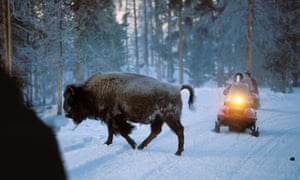https://www.theguardian.com/environment/2017/may/04/noise-pollution-is-drowning-out-nature-even-in-protected-areas-study
The sounds of the natural world are being overwhelmed by the blare of human activity, even in protected wildlife areas, new research has revealed.
The racket is not only harming people’s enjoyment of natural havens, which are known to have significant benefits for both physical and mental health, but it is also affecting wildlife, with animals less able to escape predators and birds less able to find mates.
Scientists used over one million hours of sound recordings from 492 locations in protected areas in the US to calculate that in about two-thirds of places, the noise pollution from human activities was double the background sound levels. A fifth of the protected areas suffered human noise levels that were 10 times background levels, the researchers found.
“Next time you go for a walk in the woods, pay attention to the sounds you hear – the flow of a river, wind through the trees, singing birds, bugling elk. These acoustic resources are just as magnificent as visual ones, and deserve our protection,” said Rachel Buxton, at Colorado State University and who led the study published in the journal Science on Thursday.
“They make us feel good and are important for our physical and emotional wellbeing,” she said. “We actually have research that shows that natural sounds improve our mood, increase our memory retention and restore our senses.”
Animals use noise for many essential functions, such as dodging predators, finding food and mates and maintaining relationships in social groups, Buxton said: “So not being able to hear these sounds has serious consequences.”
The impact of noise can cascade across entire ecosystems, she said, even leading to effects on plants as the wildlife that interact with them changes. “Although plants can’t hear, many animals that disperse seeds or pollinate flowers can hear, and are known to be affected by noise,” said Buxton, adding that plant grazers could also become more abundant if noise drives their predators away.
The researchers identified the key causes of noise pollution as roads and air traffic, settlements and the extractive industries, such as forestry, fracking and mining. With a tenfold increase in background noise, as found in a fifth of the protected areas, natural sounds that would have been detectable 100m away can only be heard when 10m away.
In the areas defined as wilderness, which are meant to entirely to be “untrammeled by man”, according to US law, 12% still experienced a doubling of background noise due to human activities. The problem of noise also seriously affected the habitat of endangered species, such as the San Marcos salamander and San Bernardino kangaroo rat.
The researchers note that protected area laws in the US do not include measures to monitor or manage noise pollution from human activities: “This is a conspicuous missed opportunity, as techniques to manage noise pollution are readily available.”
Such techniques, already in place in some protected areas, include providing shuttle services to cut back on visitor traffic and confining noise into specific corridors by aligning flight patterns over roads. There have also been moves to cut the noise from motor boats and snowmobiles in Yellowstone national park and to reduce aircraft flyovers over the Grand Canyon.
The new research on noise pollution in natural areas is much needed, said Noelle Kumpel, policy programme manager at the Zoological Society of London: “It is a hidden impact that we don’t really think about. We, as humans, value and appreciate peace and quiet and wildlife reacts in the same way. Noise levels are important to that level of enjoyment and what we humans and animals get from nature.”
Kumpel said there was evidence of human-related noise harming wildlife around the world, from oil drilling driving elephants away in Uganda to underwater noise causing mass strandings of whales in the Canary Islands. She said a balance needs to be found between ensuring human impacts are limited in the wildest areas and allowing people to experience the joys of nature.
Since you’re here …
… we’ve got a small favour to ask. More people are reading the Guardian than ever, but far fewer are paying for it. Advertising revenues across the media are falling fast. And unlike many news organisations, we haven’t put up a paywall – we want to keep our journalism as open as we can. So you can see why we need to ask for your help. The Guardian’s independent, investigative journalism takes a lot of time, money and hard work to produce. But we do it because we believe our perspective matters – because it might well be your perspective, too.
Because I appreciate there not being a paywall: it is more democratic for the media to be available for all and not a commodity to be purchased by a few. I’m happy to make a contribution so others with less means still have access to information.
Thomasine F-R
If everyone who reads our reporting, who likes it, helps to support it, our future would be much more secure.

沒有留言:
張貼留言